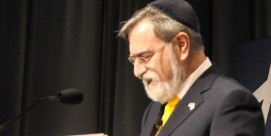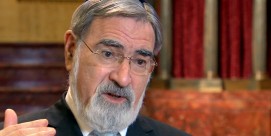Tobias Winright: Post War Just War
In his sober address to the nation, President Obama announced the combat mission in Iraq is at an end.
As a theological ethicist who subscribes to all the criteria of the just war tradition—the version Mennonite pacifist John Howard Yoder said has “teeth”—I was critical from the outset of the US-led war in Iraq. In the seven years since Operation Iraqi Freedom began, I have regretted that perhaps just war ethicists, including myself, did not do enough to oppose it, especially if we really regarded it as an unjust war.
What does it mean now to say the war is at an end? “End” can mean “stopped” or “concluded,” but it is important that Christians and others, for whom just war continues to be a valid moral approach to dealing with serious threats to innocent human lives, recover another understanding of what “end” means. The end, understood in the just war sense of “purpose” or “goal,” should be, as St. Augustine taught, tranquillitas ordinis or “tranquil order”—a just and lasting peace, a genuine peace that is more than merely the absence of war.
Such a peace should be restorative for all affected by the war. President Obama observed that around the world today “old adversaries are at peace,” and I suspect he had in mind US friendships with Germany, Italy, and Japan. He said our combat mission is ending, but “our commitment to Iraq’s future is not,” and he emphasized at the same that we are now also trying to build for our nation “a future of lasting peace.” That involves refocusing attention on the US economy, and it will include providing health care, education, and employment for returning US military personnel. All of this is congruent with a just war meaning of “the end.” Much of it, however, should have been in our sights from the very outset of the war.

The president referred to “lessons learned.” One lesson those who subscribe to the just war criteria should have learned is that just war categories need to be longitudinally extended to include postwar justice. Even if the wars in Iraq and Afghanistan were just, more needs to be done to guide us to put in motion the ingredients for a just and lasting peace. On the flip side, if a war is unjust because the criteria for going to war and for conduct during war were not satisfied, then the duty to establish postwar justice is all the more imperative, even though that won’t retroactively make it a just war.
One postwar criterion would be the principle of restoration, including restoration of public services such as the police: before embarking on war, make sure appropriate plans, equipment, and personnel are ready and in place to restore law and order on the streets and in the communities of the defeated nation. In his speech President Obama mentioned that US troops “shifted tactics to protect the Iraqi people [and] trained Iraqi Security Forces.” Such a shift would not have been necessary had the Bush White House not denied in June 2003 the Department of Justice’s recommendations for an International Criminal Investigative Training Assistance Program, which called for the deployment of over 6,600 international police advisers, consisting of trainers for police academies, plus armed international constabulary units with 2,500 more personnel to help coalition military forces restore stability in Iraq (see “The Police in War: Fighting Insurgency, Terrorism, and Violent Crime” [Lynne Rienner Publishers, 2010] by David H. Bayley and Robert M. Perito). Meanwhile, there were looters raiding homes, businesses, and museums; Iraqis were killing Iraqis; government buildings were ransacked and burned. Many scholars in other fields—including security policy experts such as Graham Day and Rama Mani—highlight the crucial role police (as well as courts and prisons) play in the transition from war to a just peace. Oftentimes the police of the defeated country disband during the war or are corrupt or implicated in the evils that led to war, so a transitional police force, accompanied by trainers, is necessary until a new force consisting of vetted, well-trained, and human-rights-respecting police is in place.
I am hopeful that progress in this connection is now underway in Iraq and Afghanistan. But in the meantime too many persons suffered—Iraqis, Afghans, and also US military personnel—from a lack of the kind of efforts that postwar justice would require for any war to be considered just.
Tobias Winright is associate professor of theological ethics at Saint Louis University, a former law enforcement officer, and coauthor with Mark Allman of “After the Smoke Clears: The Just War Tradition and Post War Justice” (Orbis Books, 2010).







